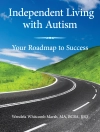As awareness and understanding of Asperger Syndrome and Autism Spectrum Disorder increases, more adults are identifying themselves as being on the spectrum and seeking formal diagnosis. This book discusses the process, the pros and cons, and the after-effects of receiving an autism diagnosis in adulthood.
Outlining the likely stages of the journey to diagnosis, this book looks at what the individual may go through as they become aware of their Asperger characteristics and as they seek pre-assessment and diagnosis, as well as common reactions upon receiving a diagnosis – from depression and anger to relief and self-acceptance. Combining practical guidance with advice from personal experience and interviews and correspondence with specialists in the field, the book discusses if and when to disclose to family, friends and employers, how to seek appropriate support services, and how to use the self-knowledge gained through diagnosis to live well in the future.
Table des matières
Acknowledgements. Forewords by Luke Beardon and Sara Heath. Preface. Introduction. 1. The Stages of Late Diagnosis of Asperger Syndrome (Autism Spectrum Disorder). 2. Living Without Diagnosis (Pre-Self-Identification). 3. Pre-Assessment and Diagnosis. 4. The Advantages and Disadvantages of Diagnosis. 5. Common Reactions to Late Diagnosis. 6. The Coming Out Process. 7. How to Live Well with your Diagnosis. International Directory of Resources. Appendix: The AQ Test. Glossary of Terms. References. Further Reading.
A propos de l’auteur
Philip Wylie sought a diagnosis of Asperger Syndrome at the age of 51 after reading an article about autism in an accountancy magazine and having a “Eureka” moment! He previously worked as Finance Director and Company Secretary of a British offshore bank, before relocating to Thailand where he began personal study of psychology and complementary healing practices on his path to self-realisation. Before and since receiving his diagnosis he has researched autism extensively and undertaken a survey into late diagnosis with Autonomy Autism Services and writing projects for the NAS, UK.












